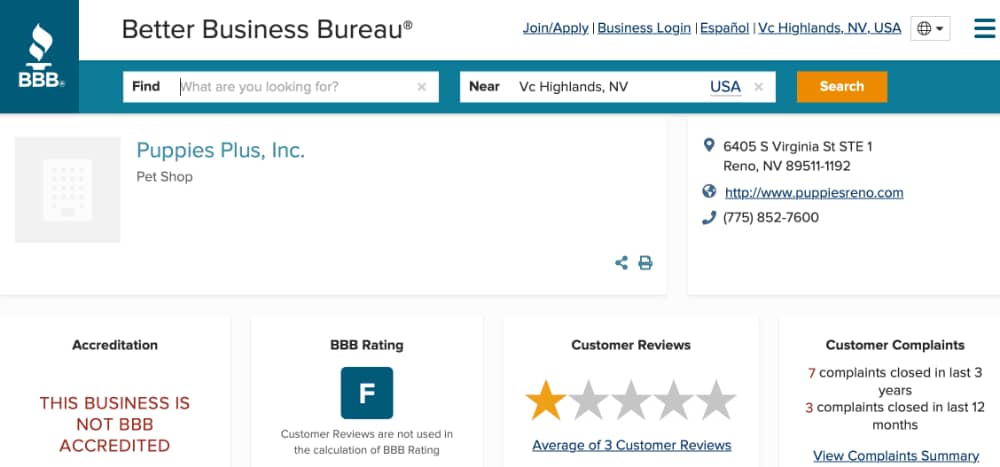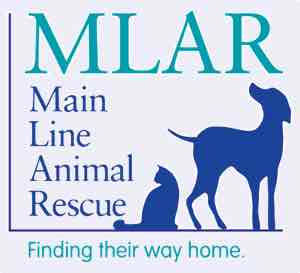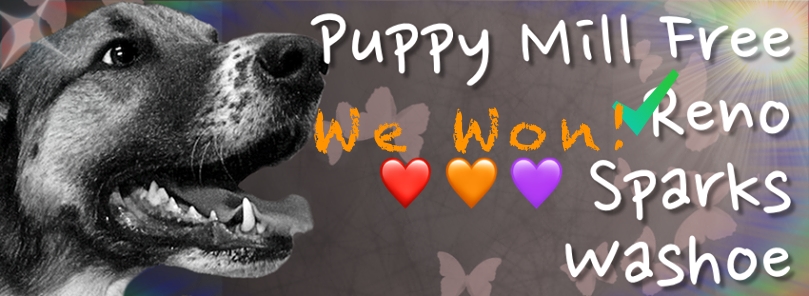Puppies Plus/Puppy Love Long-Standing BBB "F" (lowest) score

bookmark_border Selected Articles
-
 Puppy Mills — Wikipedia
Puppy Mills — Wikipedia
A puppy mill, sometimes known as a puppy farm, is a type of commercial dog breeding facility. They are all around the world and have similar characteristics. Although no standardized legal definition for "puppy mill" exists, a definition was established in Avenson v. Zegart in 1984 as "a dog breeding operation in which the health of the dogs is disregarded in order to maintain a low overhead and maximize profits". The ASPCA uses a similar definition: "a large-scale commercial dog breeding operation where profit is given priority over the well-being of the dogs." According to the Humane Society of the United States, there are an estimated 10,000 licensed and unlicensed puppy mills in the United States, in total selling more than 2,000,000 puppies annually. In Australia around 450,000 puppies are sold each year and in England approximately 400,000 are sold each year.
The characteristics of a puppy mill are, as said in the report by the Humane Society Veterinary Medical Association, "Emphasis on Quantity not Quality, Indiscriminate Breeding, Continuous Confinement, Lack of Human Contact and Environmental Enrichment, Poor Husbandry and Minimal to No Veterinary Care." Dog breeders focus on quantity not quality meaning, their goal is to breed as many puppies as possible for the most amount of revenue. When there is a rise in demand on a certain type of dog, breeders/puppy mills try to meet that demand but when these dogs do not sell, most of them end up in animal shelters or euthanized. When dog breeders focus more on quantity rather than quality, overpopulation is created in the puppy mills and diseases are more likely to spread. According to the Humane Society Veterinary Medical Association, indiscriminate breeding is when, "dogs are bred early and often and there is often no screening for heritable disorders, resulting in generations of dogs with unchecked hereditary defects." These dogs rarely go outside. In some mills they are allowed outside for a short amount of time per day. While in these puppy mills, the dogs get no time to walk or play because they are housed in the small crates with little space. Being in a small space and not being able to be active causes stress and affects their development. The puppies do not get to interact with other humans when living in puppy mills, they do not get treats or toys. Not being able to interact with humans can lead to behavioral problems. Puppy mills are unsanitary, their water is usually dirty, the food is not healthy for the dogs and no one cleans up after them. The puppy mill dogs get little to no veterinary care. The Humane Society Veterinary Medical Association stated, "Breeding dogs in puppy mills often suffer from injuries and diseases that go untreated. Injuries and disorders that affect a dog's reproductive capabilities are rarely treated. Arguably the worst problem is the untreated advanced dental disease, causing infection, pain, and in severe cases, the loss of part or all of the mandible and maxilla."
The term "mill" is also applied to operations involving other animals commercially bred for profit, including cats. For-profit breeding on a smaller scale may be referred to as backyard breeding. Although this term has negative connotations and may also refer to unplanned or non-commercial breeding.
-
 The Dog Factory: Inside the Sickening World of Puppy Mills— Rolling Stone
The Dog Factory: Inside the Sickening World of Puppy Mills— Rolling Stone
An investigation into the underworld of America's overcrowded dog farms, the secret shame of the pet industry
Then we found the door that led to the basement. Down there, dozens of puppies in dust-cloaked cages stood on their hind legs and bawled. There were Yorkies and poodles and Maltese mixes, but their fur was so matted and excrement-mottled it was hard to tell which from which. Bred for profit, most of them would have been sold in pet stores or on websites by their third or fourth month of life.
HSUS staffers had gathered evidence that the breeder, Patricia Yates, was selling puppies on multiple websites without a license, and had a stack of buyer complaints lodged against her. But it took a tip from an anonymous source to alert the Sheriff's office to the scale of Yates's operation. "We'd been out there before, but had no idea it was this severe," says Lt. David Taylor, an animal-control cop who helped launch the investigation. Obtaining an arrest warrant was the least of it, though. When you bust an illegal kennel, you're suddenly swamped with sick dogs, often double what had been reported. It took Taylor a month to coordinate with HSUS — the rare non-profit with the money and equipment to house and treat puppy-mill rescues — before launching the raid on Yates's kennel.
Back up the stairs, we followed more barking to a porch bricked in by the owner. It was pitch-black inside, and the smell was a hammer. Here were the parent dogs in desperate shape: blinded by cataracts and corneal ulcers; their jaws half-gone or missing entirely after their teeth had rotted away. Some were so feeble they couldn't stand erect; their paws were urine-scalded and their wrists were deformed from squatting on wire their entire lives.
-
 Investigating Puppy Mills — Oprah
Investigating Puppy Mills — Oprah
"It is my belief that when you actually see this, America, with your own eyes, that you are not going stand for it."
Oprah—and thousands of drivers—saw a billboard just off the Kennedy Expressway in Chicago that read, "Oprah: Do a show on puppy mills. The dogs need you."
The man behind the billboard is Bill Smith, founder of Main Line Animal Rescue. Every year, Bill and several volunteers rescue hundreds of abused, unwanted or abandoned animals, rehabilitate them and adopt them out to families. Many of the animals Bill rescues come from puppy mills, which he describes as places where bad breeders care more about the profit they make from puppies than the health or welfare of the animals. He says the dogs in puppy mills face deplorable conditions including inbreeding, minimal or no vet care, limited shelter and overcrowded cages.
"We were so frustrated ... and no one seemed to be helping them," Bill tells Oprah. "I know that you're a huge animal lover. I just thought that you would be able to spread the word and educate a lot of people."
The billboard certainly worked. "It is my belief that when you actually see this, America, with your own eyes," Oprah says, "that you are not going stand for it."
-
 What is a Puppy Mill?
What is a Puppy Mill?
According to the ASPCA, a puppy mill is a "large-scale commercial dog breeding operation where profit is given priority over the well-being of the dogs."
Puppies born in a puppy mill are often sold at as young as 8 weeks old, to brokers and/or retailers who then sell the puppies to the consumer. Some puppy mills sell directly to the public through web sites, newspaper classifieds or at flea markets. (ASPCA).
According to the Humane Society of the United States, there are an estimated 10,000 puppy mills in the United States, only 2,024 of which are USDA licensed.
These 10,000 operations are responsible for the sale of 2.15 million puppies in the United States. (HSUS, Puppy Mills Research)
-
 MLAR continues to fight for dogs imprisoned in our nation's puppy mills.
MLAR continues to fight for dogs imprisoned in our nation's puppy mills.
We all know puppy mills are bad. Factory farms where thousands of breeding dogs are kept in cages slightly larger than their own bodies.
Underfed dogs feeding an industry of corruption and greed. Instead of walking on grass, they spend a lifetime on painful wire flooring in cramp rabbit hutches. Instead of collars or bandanas, they wear rusted livestock clips in their ears or chains with USDA tags embedded in their necks. Undeserving of a name after eight years of service, a breeding female is often starved to death or led into a dark cornfield and shot once she can no longer produce puppies for market.
-
 Buyer Beware: The Problem with Puppy Mills and Backyard Breeders
Buyer Beware: The Problem with Puppy Mills and Backyard Breeders
Puppy mills are commercial breeding facilities that mass-produce dogs (and cats in cat mills) for sale through pet stores, or directly to consumers through classified ads or the Internet. Roughly 90 percent of puppies in pet stores come from puppy mills. Many retailers who buy animals from such facilities take the wholesaler's word that the animals are happy and healthy without seeing for themselves.
In most states, these commercial breeding kennels can legally keep hundreds of dogs in cages their entire lives, for the sole purpose of continuously churning out puppies. The animals produced range from purebreds to any number of the latest "designer" mixed breeds. Cat breeding occurs under similar conditions to supply pet stores with kittens.
-
 The Amish And Puppy Mills: The Puppy Mill Project
The Amish And Puppy Mills: The Puppy Mill Project
The Amish are not quite as anachronistic as they may appear at first glance: contemporary Amish have cell phones, caller ID, answering machines, generator-operated heaters and propane-driven appliances. While car ownership is banned, they see nothing wrong in riding in them and often hire others to shuttle them around town. Telephones are not allowed in Amish homes, but many are found in barns or booths, called shanties. Many Amish own freezers but keep them in non-Amish neighbors' homes, sometimes paying rent for the space. (Mennonites, the older, less-strict religious order from whom the Amish split in the 1600's, drive cars and have electricity. Old Order Mennonites, also known as "horse & buggy" Mennonites, are but a mirror image of the Amish.)
Besides raising cows and chickens, hundreds of Amish (and Mennonites), are engaged in another "agricultural" venture, that of large-scale dog breeding known as puppy mills. When it comes to the subject of dog breeding and the Amish, nowhere are the sounds of silence by tight-lipped local officials and the Tourism Board more apparent. Given that the Amish are well known for their agricultural skills, it's no wonder that most people are stunned when told that many Amish, with their large-scale commercials kennels, are responsible for Pennsylvania's reputation among the animal welfare community as the "puppy mill capital of the east."
-
 One in five puppies bought online die before they reach six months old and many are more aggressive
One in five puppies bought online die before they reach six months old and many are more aggressive
Welfare organisations claim such breeders are only interested in profits, not the animals' health or well-being.
As a consequence, many die due to poor health while still puppies or require expensive veterinary treatment. They are also more likely to display aggressive or unsociable behaviour.
Experts warn that any prospective owner should ideally buy their pet from a registered breeder or a rescue centre, and visit the premises to see the puppy with its mother and inspect health certificates.
-
 Something Stinks: The Need for Environmental
Something Stinks: The Need for Environmental
Regulation of Puppy MillsThe overwhelming smell is always the first to hit you. Next it is the sound; twenty-five to forty wire mesh cages, many containing multiple puppies, line the walls of this Conshohocken, Pennsylvania pet store. The cages have drip pans underneath, which are supposed to allow for easy clean up of waste, but the puppies are still covered in their own excrement and urine. When asked about the breeding information for a beautiful, friendly American-Eskimo Keeshond designer mix selling for five hundred dollars, the store employee gives a generalized description of "somewhere in Pennsylvania." Skirting the identification of a puppy's breeder can be a puppy mill warning signal.
-
 AKC-registered breeders raising dogs in 'miserable' conditions
AKC-registered breeders raising dogs in 'miserable' conditions
New accusations that one of the country's largest organizations dedicated to dogs... isn't doing enough to protect animals.
New accusations that one of the country's largest organizations dedicated to dogs, the American Kennel Club, isn't doing enough to protect animals.
TODAY National Investigative Correspondent Jeff Rossen reports.
When you go to buy a puppy, you want it to be happy, healthy and well-treated. A lot of people count on the American Kennel Club to find a breeder. When you see that AKC seal, you think to yourself: "I'm getting a good dog." But we've discovered disgusting conditions and sick dogs at AKC-registered operations.

